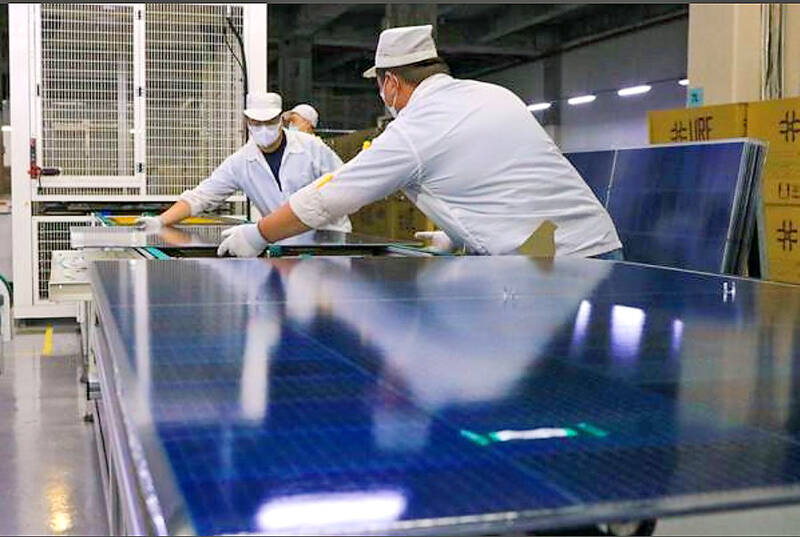United Renewable Energy Co (URE, 聯合再生), one of the nation’s biggest solar module manufacturers, yesterday said it is developing next-generation solar modules with a higher conversion rate and tapping into the energy storage market in its latest efforts to turn around the grim solar sector.
The Hsinchu-based solar company said it is developing perovskite solar modules with a conversion rate of 26 percent, which is 3 percent or 4 percent higher than the silicon-based solar modules it makes using TOPCon technology.
URE’s aim is to boost the conversion rate to more than 30 percent over the next three to four years, company chairman Sam Hong (洪傳獻) told reporters yesterday.

Photo on courtesy of United Renewable Energy Co
Solar modules with higher conversation rates are more suitable for population-dense areas with limited land to deploy ground-mounted solar farms, he said.
The company plans to start shipping the first batch of perovskite solar modules by the end of next year.
“We have new teams focused on exploring new business [for growth] in addition to our existing solar module businesses,” Hong said, adding that URE is making inroads into the energy storage market.
The company plans to offer behind-the-meter (BTM) energy storage and energy management solutions for enterprises to address the widening gap of electricity rates between peak and off-peak hours.
Based on URE’s calculations, the rate for industrial users during peak hours is about NT$8 per unit, which is four times higher than the NT$2 per unit charged by Taiwan Power Co (台電) during off-peak hours.
A BTM battery storage provides cost-effective power that can be used on site without passing through a meter. URE plans to build its first BTM storage in Tainan with an investment of NT$75 million (US$2.36 million). The facility, with 4-megawatt capacity, would start operations by the second quarter of next year, the company said.
The new business strategies come as URE and its local peers have been struggling to make a profit in the past one-and-half years due to sluggish market demand and dipping solar prices at home and in overseas markets.
The company said solar market prospects remain grim this year. Demand is picking up, but the recovery has fallen short of its expectations mainly due to bureaucratic inertia at home. URE originally said demand would bounce back rapidly after the presidential election earlier this year because of reduced uncertainty about the government’s energy policy.
“We are expecting an improvement in the fourth quarter, which is usually a peak season for the industry. However, it is premature to say how much improvement we are going to make,” URE chief financial officer Pan Laylay (潘蕾蕾) said.
Revenue and factory utilization would improve this quarter compared with last quarter, Pan said, adding that factory utilization fell to less than 50 percent in the first half of this year.
The company posted NT$1.11 billion in losses for the first half of this year, up from a loss of NT$363 million during the same period last year.
Revenue plummeted 63 percent year-on-year to NT$2.86 billion during the first two quarters, compared with NT$7.64 billion a year earlier.

Taiwan’s foreign exchange reserves hit a record high at the end of last month, surpassing the US$600 billion mark for the first time, the central bank said yesterday. Last month, the country’s foreign exchange reserves rose US$5.51 billion from a month earlier to reach US$602.94 billion due to an increase in returns from the central bank’s portfolio management, the movement of other foreign currencies in the portfolio against the US dollar and the bank’s efforts to smooth the volatility of the New Taiwan dollar. Department of Foreign Exchange Director-General Eugene Tsai (蔡炯民)said a rate cut cycle launched by the US Federal Reserve

Handset camera lens maker Largan Precision Co (大立光) on Sunday reported a 6.71 percent year-on-year decline in revenue for the third quarter, despite revenue last month hitting the highest level in 11 months. Third-quarter revenue was NT$17.68 billion (US$581.2 million), compared with NT$18.95 billion a year earlier, the company said in a statement. The figure was in line with Yuanta Securities Investment Consulting Co’s (元大投顧) forecast of NT$17.9 billion, but missed the market consensus estimate of NT$18.97 billion. The third-quarter revenue was a 51.44 percent increase from NT$11.67 billion in the second quarter, as the quarter is usually the peak

Nvidia Corp’s major server production partner Hon Hai Precision Industry Co (鴻海精密) reported 10.99 percent year-on-year growth in quarterly sales, signaling healthy demand for artificial intelligence (AI) infrastructure. Revenue totaled NT$2.06 trillion (US$67.72 billion) in the last quarter, in line with analysts’ projections, a company statement said. On a quarterly basis, revenue was up 14.47 percent. Hon Hai’s businesses cover four primary product segments: cloud and networking, smart consumer electronics, computing, and components and other products. Last quarter, “cloud and networking products delivered strong growth, components and other products demonstrated significant growth, while smart consumer electronics and computing products slightly declined,” compared with the

The US government on Wednesday sanctioned more than two dozen companies in China, Turkey and the United Arab Emirates, including offshoots of a US chip firm, accusing the businesses of providing illicit support to Iran’s military or proxies. The US Department of Commerce included two subsidiaries of US-based chip distributor Arrow Electronics Inc (艾睿電子) on its so-called entity list published on the federal register for facilitating purchases by Iran’s proxies of US tech. Arrow spokesman John Hourigan said that the subsidiaries have been operating in full compliance with US export control regulations and his company is discussing with the US Bureau of